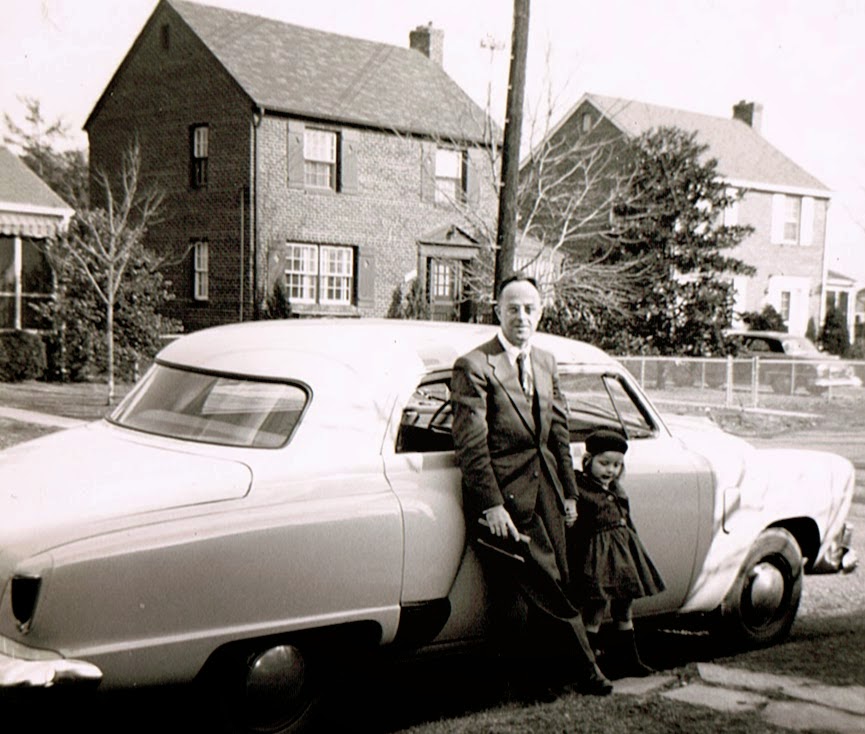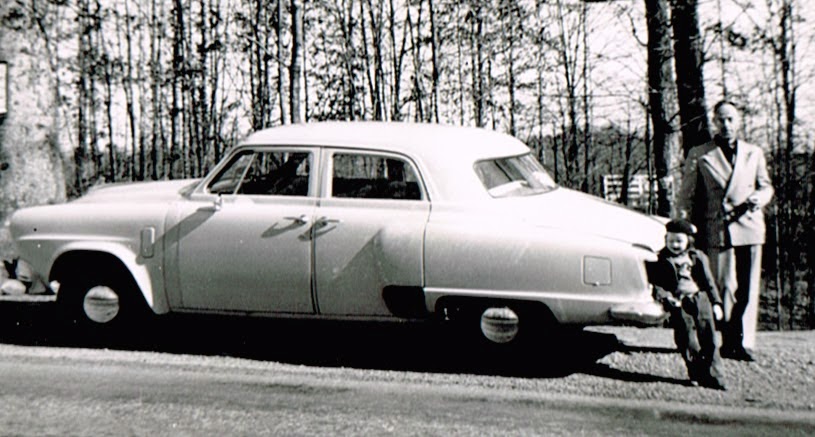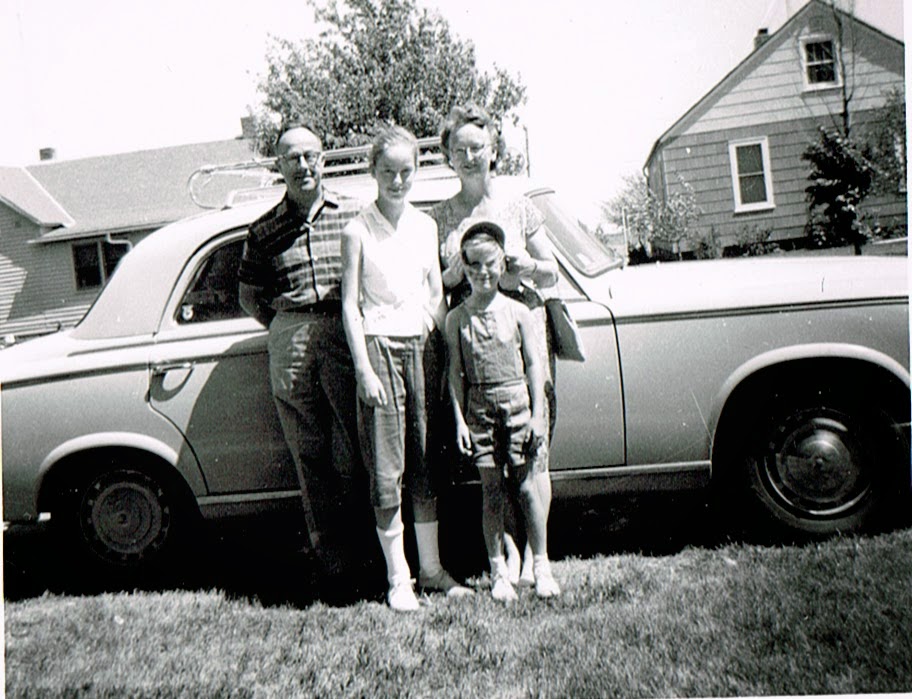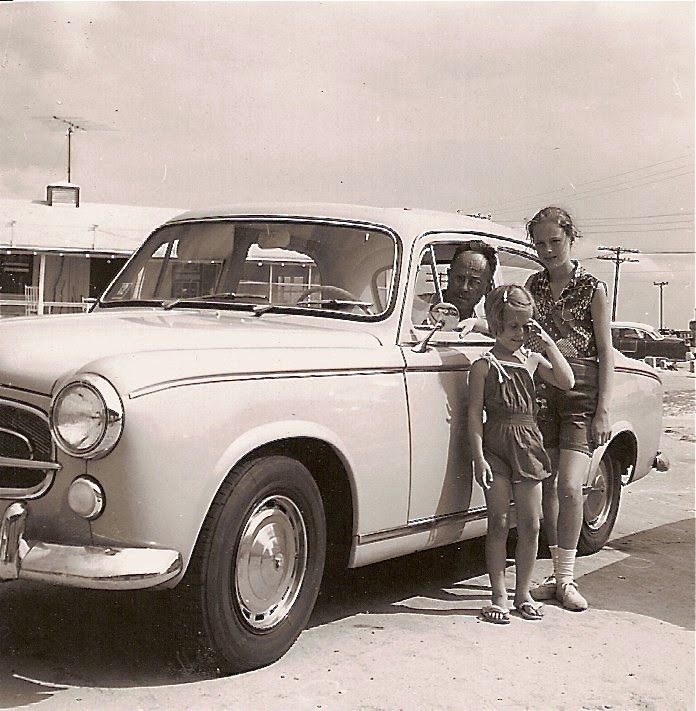When seat belts first came out, Dad was grumbly about it. He thought they were a terrible idea. They would give the driver a false sense of security and he wouldn’t pay proper attention to his driving. In spite of the fact that my father had an excellent grasp of physics, he thought kids were amply protected during sudden stops by the paternal forearm to the larynx.
And it’s not that he was an actual attentive driver. He was always veering off the pavement when he spotted birds or roadside mushrooms and wasn’t always real wedded to his own lane. We kids rolled around the bench seats like BBs in a box.
But I found myself thinking he might have had a point when I read of the plans to introduce collision-avoidance technology in cars. Benevolent satellites will be drafted to monitor our positions and trajectories and give drivers advance warning–which is the very best kind of warning–if a collision is imminent. The driver will be alerted by a flashing light or a sound or a vibration in the seat.
This will not be helpful to me. If I’m driving in familiar territory, my mind is somewhere else entirely, and I’m easily startled. If a warning squawk were to go off, I would stand on the brakes and get hit from the rear. I’d be better off with a device that would warn me I was going to get into an accident before I left home. I’d just stay put, and all would be well.
They did a study of traffic and discovered that accidents went way down in rotaries without stop signs where drivers were expected to pay attention to each other and navigate accordingly. Intersections governed by lights or signs led people to trust that everything was under control and they no longer noticed if they were in trouble. In our neighborhood we had no stop signs on the residential streets thirty years ago. No problem. We slowed down at intersections. Then someone got worried about safety and the stop signs began to appear. Motorists promptly interpreted them as permission to gun it if you didn’t see a stop sign.
It’s the human element that’s going to ball up the works. We’re already driving while immersed in a conversation with someone miles away. It’s not hard for me to imagine that if people were equipped with a car that prevented collisions, they’d never bother to look at the road at all. That kind of technology will work really well only when everyone has it, and the cars drive themselves.
I’m not a good driver anyway. The moment I open the door to get in my car is the last time I remember where I’m going. Once I get it in gear, I no longer know, because I have left it in the hands of the neuronal GPS system in my brain. There is a tiny little Murr up there in a crisp uniform and dapper hat with her tiny hands on a little tiny wheel, and she is in charge of delivering me to my destination. Sadly, there are many other wheels up there, and they’re all spinning. I am writing a poem to cheer up a friend. What rhymes with colonoscopy? I am thinking, as the miles roll under my wheels. Moscow pee? That’s ridiculous. Rework. I turn onto the freeway. I head west. I get off. I head east. I’m all over the place.
No need to put colonoscopy at the end of a line. What rhymes with reaming? I take the downtown exit. I pull up to a stoplight.
Can I work the phrase “in arrears” in here somewhere? Scope/grope? Wallop/polyp? Flattery/splattery? It is not possible to gauge elapsed time while writing a colonoscopy commemoration. Sometimes my little GPS pilot suddenly fears I’m holding up traffic and directs me to go again, although the light has not turned green.
Worse, sometimes I pull up somewhere and put it in park and–although it takes a few moments of concentration to realize it–I’m not where I had originally planned to go. I thought I was going to the post office. But there I am at a brewpub.
They say that 90% of accidents occur within 25 miles of home, which is why I try to park so far away. Mostly, I just walk. It’s harder to get up to ramming speed that way.




Note to self; politely decline if Murr offers a lift anywhere.
That kind of technology will work really well only when everyone has it, and the cars drive themselves.
Bingo. If humans are too incompetent to drive without computer assistance, and too careless to drive with computer assistance, then the computers will have to do it all for us.
I've heard that's exactly what is being planned. I hope it gets here before I have to give up the keys.
Oh, and…..
Oh spare me your damned colonoscopy
The last time I walked past the mosque, a pea
Rolled under my boot, and its horrid squish-creaming
Still seemed far less foul than your vile techno-reaming
Though doctor you be, please try showing some class,
And keep your perv gadgets away from my….oh, never mind.
Don't worry, dear Doc, Infidel's just a hater,
But mine was terrific–same time, ten years later?
Well, isn't Infidel753 clever? I am so impressed! I wonder if Tiny Miss Murr wears tiny white gloves while she's driving. 🙂
Oh man. You just reminded me of the little white cotton gloves with the seam ridges up the fingers that some great-aunt sent us girls every Easter.
Too clever by half, Infidel 753 — and excellent to boot! I tend to agree with Miss Murr about computerized cars. My husband gets a kick out of making them say ' recalculating' — one day computer may decide to get even…
Oh, our intelligent cars are just biding their time and nursing their grudges, I can assure you. One day we'll wake up and find that a car has been elected President. Hopefully it will be a pragmatic regular-person type of car, like a Volkswagen mini-van. If so, the Republicans will claim it was manufactured in Kenya.
I guess I just hope it's a Smart car.
Much truth in this…way more humor, but still much truth.
In my car, you still have to roll the windows down using the handle. And adjust the side mirrors by hand, too. Fortunately, I can adjust the passenger side mirror from the driver's seat without lifting a cheek off the fabric.
I spent a week seven years ago in a small town in Mexico. Lots of cars, golf carts, bicycles and horses on what passed for streets. No street signs, no stop signs, and everything worked perfectly! I was so impressed, and now, thanks to your post, I understand why it worked: people paid attention!
We are getting a rotary at the entrance to our neighborhood because people on the main road don't pay attention AND they speed. A dangerous combination.
I'm afraid I'm one of those people who never quite gets up to speed. But y'all knew that.
And where were we going next Wednesday?
Uh-oh! Busted!
Well, at least you ended up at the brew pub. It might not have been where you *planned* to go, but it was probably where you *wanted* to go.
Tiny Murr knows what Tiny Murr wants.
I get in the car as rarely as I walk, which means I stay home. If I knew how to catheter myself I wouldn't have to walk to the bathroom. Accidents rarely happen on the couch.
They do if you can't walk to the bathroom.
I've done that thing – aimed for one place and ended up in another. It's not a good feeling, especially when you have a witness. Said witness was too polite – or possibly too frightened – to say anything while still in motion.
Yeah. They don't even tell you you're off course. They're deeply frightened. Bwa ha ha ha.
Oh dear. My feelings of inadequacy are nurtured here. You take some nebulous thoughts from out of the porridge in my head, polish them and turn them into diamonds. Left to me they would stay unformed (but weighty) grumbles.
Oh, best beloved. Go ahead and plagiarize if it helps!
…and sometimes when I 'm showing property to potential buyers, I will absent-mindedly/automatically drive to a listing that I had been thinking about the night before….."Earth to Ed! Buyer wants to see 2-bedroom condos! Not suburban McMansions!"
Shit, dear. Did you go through menopause, too?
I like driving. I don't want something to drive for me. Those cars that park for you so that you have to lift your hands off the wheel scare the ever-livin' tar right out of me. I get mad at the anti-skid thingummy in my car in the winter that won't let me pump the brakes on ice and slides me right into the intersection, so I shut the blasted thing off. And that blasted GPS has no clue about local shortcuts either. But Murr, I do agree with you about the drifting off somewhat and not remembering how I got home. Thank heavens the car knew that much!
Well, there used to be a number of times I couldn't remember how I got home, but that was due to something else altogether. Hey! Speaking of new things, how do people motion each other to roll down the window now? Just make and up-and-down motion with an index finger?
That's why I still drive a standard. Much more fun AND you can use the hand break in an emergency.
Seat belts: when they became available, I told my father I would buy them for him. He wouldn't accept until I cried.
I seldom drive now (that was more than fifty years ago), but I would gladly accept a car with advance warning systems, because it's the other drivers I am worried about.
It's me you're worried about.
When vehicles are made idiot proof only idiots will be driving.
That will be a big change, huh?
Yet another reason I'd rather be on the back of a horse. 🙂
Are you aware of how TALL and ALIVE they are? Scary.
Finally getting caught up on your blog. Sometimes find them through Facebook and sometimes through Feedly so I often end up skipping around. Great post. SOO glad I'm not alone. I pretty much rely on my car GPS to get me where I'm going. But I do have to monitor it – sometimes, when I'm looking for cheap/free campsites, I end up in the middle of the night with no last turn to my destination.
I have this feeling that having GPS capability will just make me loster.
I drive, as often as not, on autopilot. And sometimes I come to on the highway not knowing where I am. I just keep on going, looking for landmarks. Then sometimes I have to turn around and go back to where I had intended to be.
The autopilot has a mind of its own. And no map.
It's all good; I've discovered many interesting places that way.